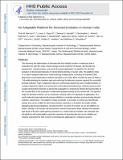An Adaptable Platform for Directed Evolution in Human Cells
Author(s)
Berman, Chet Michael.; Papa, Louis John; Hendel, Samuel J.; Moore, Christopher Lawrence; Suen, Patreece H.; Weickhardt, Alexander F.; Doan, Ngoc Duc; Kumar, Caiden M.; Butty, Vincent L. G.; Shoulders, Matthew D.; ... Show more Show less
DownloadAccepted version (1.283Mb)
Terms of use
Metadata
Show full item recordAbstract
The discovery and optimization of biomolecules that reliably function in metazoan cells is imperative for both the study of basic biology and the treatment of disease. We describe the development, characterization, and proof-of-concept application of a platform for directed evolution of diverse biomolecules of interest (BOIs) directly in human cells. The platform relies on a custom-designed adenovirus variant lacking multiple genes, including the essential DNA polymerase and protease genes, features that allow us to evolve BOIs encoded by genes as large as 7 kb while attaining the mutation rates and enforcing the selection pressure required for successful directed evolution. High mutagenesis rates are continuously attained by trans-complementation of a newly engineered, highly error-prone form of the adenoviral polymerase. Selection pressure that couples desired BOI functions to adenoviral propagation is achieved by linking the functionality of the encoded BOI to the production of adenoviral protease activity by the human cell. The dynamic range for directed evolution can be enhanced to several orders of magnitude via application of a small-molecule adenoviral protease inhibitor to modulate selection pressure during directed evolution experiments. This platform makes it possible, in principle, to evolve any biomolecule activity that can be coupled to adenoviral protease expression or activation by simply serially passaging adenoviral populations carrying the BOI. As proof-of-concept, we use the platform to evolve, directly in the human cell environment, several transcription factor variants that maintain high levels of function while gaining resistance to a small-molecule inhibitor. We anticipate that this platform will substantially expand the repertoire of biomolecules that can be reliably and robustly engineered for both research and therapeutic applications in metazoan systems.
Date issued
2018-12Department
Massachusetts Institute of Technology. Department of Chemistry; Massachusetts Institute of Technology. Department of Biology; Koch Institute for Integrative Cancer Research at MITJournal
Journal of the American Chemical Society
Publisher
American Chemical Society (ACS)
Citation
Berman, Chet M. et al. “An Adaptable Platform for Directed Evolution in Human Cells.” Journal of the American Chemical Society 140 (2019): 18093-18103 © 2019 The Author(s)
Version: Author's final manuscript
ISSN
0002-7863